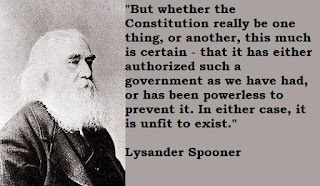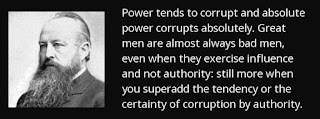After years of study and contemplation, I
have come to the realization that the US Constitution is not now, nor has it
ever been a true friend to liberty. So long as “conservatives” and “patriots”
continue to worship the US Constitution there will be no restoration of true
liberty to any of the American States.
The founding document of the American
Republic was NOT the Constitution, but rather the Articles of
Confederation that were written in 1777-1778 and ratified by the States in
1781, while the colonies were still at war with Great Britain.
In a recent article on World Net Daily,
William J. Watkins Jr. noted that:
Under the Articles, each state retained “its
sovereignty, freedom, and independence, and every power, jurisdiction, and
right [not] expressly delegated to the United States, in Congress assembled.”
After the experience with British meddling in colonial affairs, the people
preferred to be governed by their own local and state leaders rather than a
distant centralized body.
. . . The Articles restricted congressional
power with term limits. Under Article V, “no person shall be capable of being a
delegate for more than three years in any term of six years.” The Articles thus
prevented the establishment of an American ruling aristocracy.
. . . Before the Confederation Congress could
borrow money, a supermajority of delegates had to approve . . . [which] was
meant to protect the fiscal soundness of the government and to prevent the
rulers from incurring unnecessary debt.
. . .The Articles established a “firm league
of friendship” among sovereign and independent states . . . states were not
mere administrative subdivisions of the national government depending on
Washington, D.C., to send money – with strings attached – to fund state
budgets. Control did not rest at the center, but at the peripheries.
. . . Individual liberty and state
sovereignty were placed beyond the reach of the national government.
The New World Encyclopedia article on the “Articles of Confederation” notes:
As a tool to build a centralized war-making government,
they were largely a failure. . . . The delegates could not draft soldiers and
had to send requests for regular troops and militia to the states.
Note that they say that as though it were a
bad thing! And yet a war against the strongest military power in existence was
won under such circumstances. The article continues:
Since guerrilla warfare was an effective strategy in a
war against the British Empire, a centralized government proved unnecessary for
winning independence.
There was a requirement for unanimous approval before any
modifications could be made to the Articles. Because the majority of lawmaking
rested with the states, the central government was also kept limited.
Congress was denied the power of taxation: it could only
request money from the states. The states did not generally comply with the
requests in full . . . Congress was also denied the power to regulate commerce,
and as a result, the states maintained control over their own trade policy as
well.
Once the war was won, the Continental Army was largely
disbanded. A very small national force was maintained to man frontier forts and
protect against Indian attacks. Meanwhile, each of the states had an army (or
militia), and 11 of them had navies.
It
was not long, however, before advocates of a strong central government began to
agitate for modification of the Articles to allow for a stronger central
government. A convention was formed in 1787 for the stated purpose of revising
the Articles of Confederation to “perfect” them and create a “stronger
government.”
Patrick
Henry and other liberty-loving patriots opposed the convention. Henry remarked:
The Confederation .
. . carried us through a long and dangerous war: it rendered us victorious in
the that bloody conflict with a powerful nation: it has secured us a territory
greater than that any Monarch possesses: And shall a Government which has been
thus strong and vigorous, be accused of imbecility and abandoned for want of
energy?. . . Why then tell us of dangers to terrify us into an adoption of this
new Government?…I see great jeopardy in this new Government. I see none from
our present one.
What
actually came from the convention was not a modification of the Articles, but a
scrapping of them and their replacement with something entirely different –
something that established the sort of tyrannical government that we now suffer
under.
Concerning
the proceedings of the convention, a prescient Patrick Henry simply remarked:
“I smell a rat!”
In
retrospect, almost 100 years later, Lysander Spooner would note:
But whether the Constitution really be one thing, or another, this much
is certain - that it has either authorized such a government as we have had, or
has been powerless to prevent it. In either case it is unfit to exist.
-- from No Treason: The Constitution of No Authority (1871)
-- from No Treason: The Constitution of No Authority (1871)
Today
we bemoan “executive overreach”, “executive orders”, “violations of the Bill of
Rights”, etc., as though they were something new. However, such abuses began
almost immediately upon the adoption of the Constitution and the resulting establishment
of a strong central government.
Consider just a couple of
incidents from the tenure of the first two American presidents:
- 1787 - The Constitution was adopted.
- 1789 - George Washington was sworn in as the First President.
- 1791 - The first tax was imposed on a domestic produce (distilled liquors).
- 1791 - Farmers in Pennsylvania, whose livelihood depended upon the distillation of their corn into whiskey, reacted much as the colonists had to such taxes imposed from a distant central government and refused payment.
- 1794 - President Washington raised an army and led it against the tax protesters.
- 1797 - John Adams was sworn in as the Second President
- 1798 -
Adams signed the Alien and Sedition Acts into law. They had been passed in
response to supposed foreign threats (does that sound familiar to anyone?)
- the Acts essentially prohibited any opposition to the Federal government
- they severely curtailed freedom of the press (over 20 newspaper editors were arrested)
- they provided for the arrest of recalcitrant lawmakers (a lawmaker from Vermont was actually sent to prison)
- two states actually nullified the Federal laws and it seemed possible that the new Federal union and the Constitution might soon be torn asunder (I don’t believe that it would have been a bad thing.)
Certainly
Washington and Adams were better men than the sort we have today running our
government. The problem is not the individuals, but the fallen nature of mankind
and his inclination to corruption. A strong central government gives ample
opportunity to inflame his wicked inclinations.
As
Lord Acton noted:
Power tends to
corrupt, and absolute power corrupts absolutely. Great men are almost always
bad men, even when they exercise influence and not authority: still more when
you super-add the tendency or the certainty of corruption by authority. There
is no worse heresy than that the office sanctifies the holder of it.
We don’t
need to return to the Constitution. We need to rid ourselves of it. We need not
a better strong central government, we need none at all.
A
return to the Articles of Confederation, at least as a guide, would be a good
start.
I
realize that I have barely scratched the surface here. I have raised more
questions than I have answered, but hopefully it will cause some who read these
words to delve a bit deeper and to reconsider those things we may have been
taught about the Constitution and the glorious American union.
Free Florida First advocates for a Free, Independent, Godly, Prosperous, and Traditionally Southern Florida.
Deo Vindice!
TRUST GOD!
STAY IN THE FIGHT!
NEVER GIVE UP!
NEVER QUIT!
CLICK HERE to view a PDF of our weekly paper, Just for Your Consideration.
CLICK HERE to be added to our email list.





Imagine that a ‘new, improved’ constitution is waiting on the shelf to be implemented (ram-rodded) much like the sarcastically titled “Patriot Act” was already crafted and ready for the hasty vote of intimidated/extorted/blackmailed swamp creatures.
ReplyDeleteI’ve long suspected a ‘con-con’ (Article V convention) would be convened a the ‘appropriate’ chaotic crisis/control drama.
Stampede the herd to further enslavement—then and now.